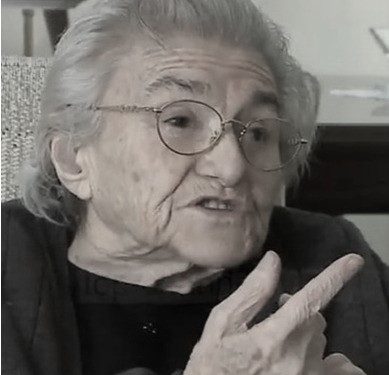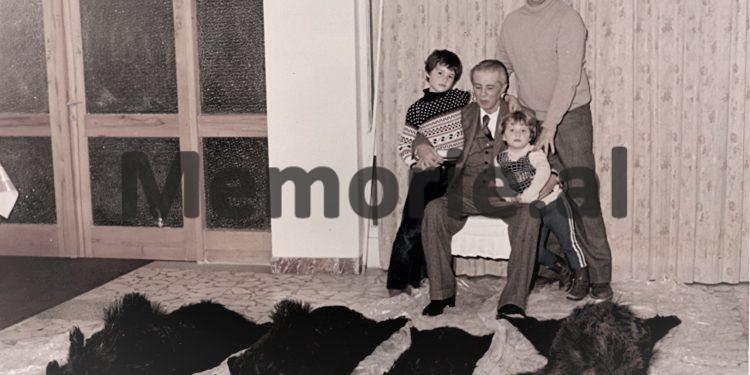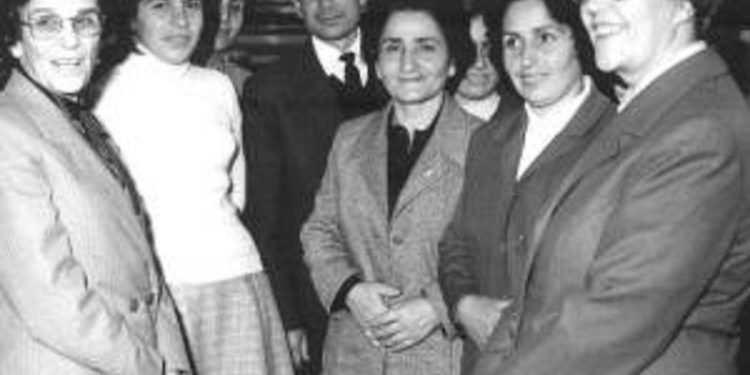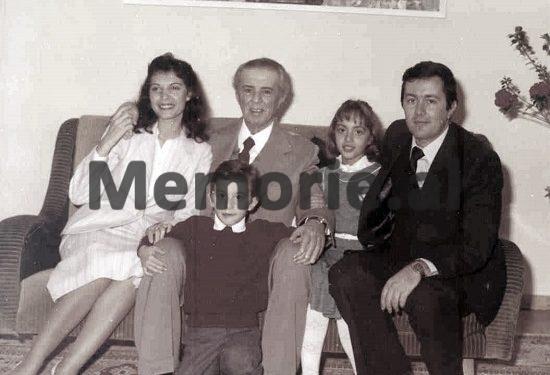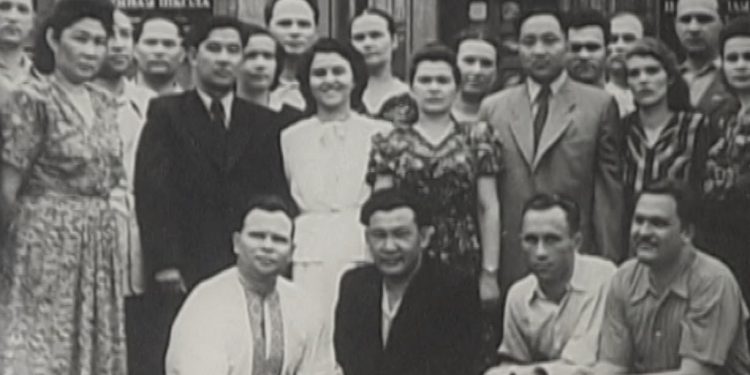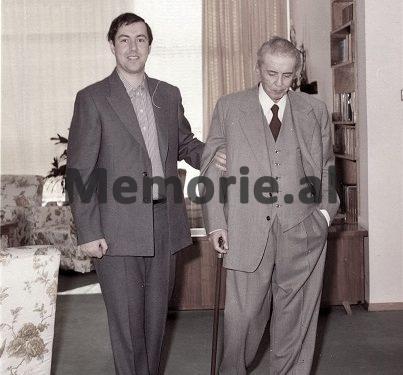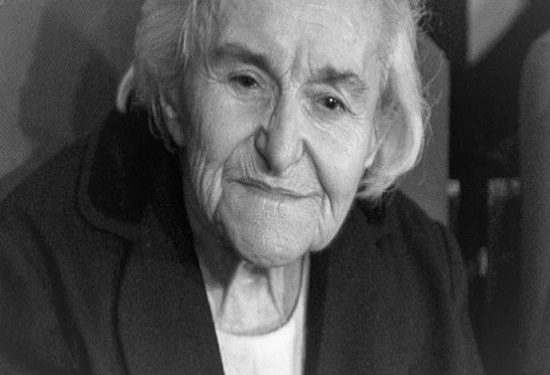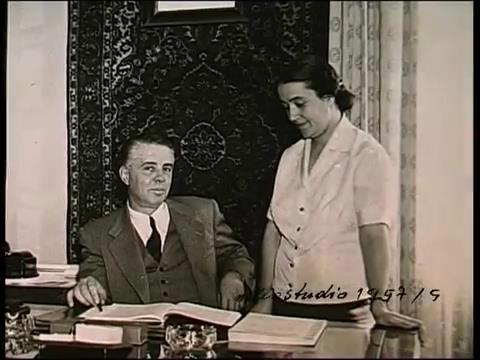By Elisabeta Ilnica
The third part
Memorie.al / She were only 16 years old, when she was accepted as a member of the Regional Committee of the Communist Youth of Tirana, that is, also of the Anti-Fascist Youth. While a year later, he was entrusted with the direction of all the youth of the capital. At the age of 18, she was elected a member of the Central Committee of the Communist Youth of Albania and soon after, she found herself in the Central Committee of the Communist Party. This was Liri Belishova, who lost her eye as a teenager in the War, while after the war, she lost the titles she received, and she lost her daughter Drita, but also two husbands, Nako Spiron and Maqo Çomon. She lost 31 years of her life in exile and many of her friends. Also educated in the former Soviet Union, one of the main exponents of the Anti-Fascist National Liberation War, a member of the Political Bureau and the Central Committee of the ALP, she was expelled in 1960 as an “enemy of the Party”, initially interned in Gjirokastër and then in Cërrik and Mallakastër, until 1991.
Continues from last issue
Did you really believe then that there would be democracy?
Certainly, there was no question that we believed it. We would all be brothers. That slogan of the French revolution, those teachings of Rousseau, we would apply: “Liberty, fraternity, equality”! Youth is the most heroic, selfless force, but it is the most manipulable force, because it does not have the experience of life, and the communists manipulated the youth, they actually did it for themselves.
So communism won because other political forces lacked organization?
Yes, that’s more. The Communist Party proved to be a party with an iron organization, with an iron discipline and extended its network as a party, as a youth, as a women’s organization, as a front organization throughout Albania, cities and villages. Then it was shown and very determined in the war, the young people who were communists, party members or not, fought heroically. This shocked the Albanian people. The murder of Qemal Stafa, who was a man who enjoyed a lot of love and respect among the youth of the people, fought heroically; the killing of Misto Mama; the killing of the heroes of Shkodra (Perlat Rexhepi, Branko Kadia and Jordan Misja), who were burned alive fighting for the homeland; the killing of Muzo Asqeri; Vojo Kushi, etc.
That is, they were heroisms that could not help but make the people their own. I was in Tirana then and believe me, we were supported then by the families of those we called reactionaries, they gave us help…! The Anti-Fascist National Liberation War took place in the conditions of the Second World War. And World War II, unlike World War I, was a war for the independence of peoples oppressed by Nazism.
It was a war for the protection of democracy, because Nazism fought democracy, calling it plutocracy. They have fought more against democracy in their propaganda than against communism. Because they underestimated communism. With “right”, then the countries that promoted democracy, including America, represented a very big force at that time.
However, there was a moment when the Ballistas attempted cooperation with the communists, and even agreed, as happened in the Mukje Agreement.
Why it broken was, were the communists or the ballisticians betrayed?
It is not even discussed about the other side…! The agreement of Mukje, in fact, has historical importance, because it would ensure the unification of the anti-fascist forces of Albania, against the occupier. So, this Agreement could avoid civil war, even fratricide, without being a civil war. But Mukja was destined not to succeed and live.
Why?
Because the disaster was on November 8, at the founding of the Communist Party, which fought in two directions: against the fascist and Nazi occupiers, but also to establish its power, the communist dictatorship. This has been its objective from the beginning. But as liberation approached, it became very important. It gained supremacy, i.e., the fight for the dictatorship of the NPSH became more important than the fight against the occupier.
With what you say, can we call it a civil war?
Despite these, I think there was no civil war, I wouldn’t call it that. The Communist Party, until the end, continued the fight on two fronts, both against the occupier, and for establishing the power of the National Liberation Councils, which were actually organs of the NPSH, like the Soviets in Russia.
But there are documents that there was fratricide…!
Undoubtedly, when an Albanian kills an Albanian, this is fratricide, but the NPSH had this favor: they helped the Albanian nationalists; they gave the greatest help to the NPSH, making an alliance with the occupiers. At first secretly, then they cooperated openly. I, in the State Archives, looking for a document for myself, that I don’t remember why I wanted it, came across a report that the Gendarmerie Command made to the Prime Minister. One of the points of the report was: “Yesterday, last night, 26 people were arrested in Tirana” and it gave the list, which included my name.
In this research, I found the document where this commander reported and said: “The forces commanded by Kadri Cakrani, – who was the Commander-in-Chief of the National Front, – although they received weapons, food, clothing, etc. from the Germans, they were still defeated in battle with the partisans. I read this myself in the document. I.e. they were not able to face the war with the NPSH, with the forces that it had gathered around itself and commanded, and then they were forced to compromise, even cooperate with the Germans.
In the “Winter Operation”, the ballisticians and the Germans were together against the partisans. In the period of the Italian occupation, there were many cases when the partisans and the ballisticians fought together against them. Hysni Kapo, at the meeting of the Second Plenum that was held in Berat, discussing it says: “We are put in a difficult position, because those from Balli (for example, in Vlora was Skënder Muço, Hysni Lepenica, who fought against the occupier) , propose us for cooperation. Hysni Lepenica tells us: Let’s decide what joint actions to do, what joint fight to do. And how can we avoid them, because you have instructed us not to agree to cooperate with the National Front in the war”.
That is, Enver Hoxha, at the head of the NPSH, together with his teacher Miladin Popovic, followed the policy of not activating the “National Front” in the war, not helping the “National Front” not to waver, on the contrary. By hitting him and not accepting the cooperation with the “National Front”, the goal was not to divide power. He, who would fight, would become a member of power. And then there was this, that the nickname “collaborator of fascism” was used for any element that was anti-communist or did not like the communist leaders. This was done for all the opponents of the NPSH; they were all called “collaborators of fascism”. Used this lot.
On the occasion of the 70th anniversary of the Liberation, the press published several articles and photos, where it is claimed that the partisans have killed innocent civilians without trial, executing them and even dancing around them. These evidences are taken from the British archives (testimonies of British officers in Albania), but also from characters who are alive, such as the case of Sami Repishti. Have such events happened?
Yes, such events have happened. I am telling a case. I was not in Tirana then, I was in Berat because the General Staff was there. But I know this very well, that among those killed were the two brothers of Musine Kokalari, Muntazi and Vesimi. One of her brothers, Muntazi, who was a lawyer, was the husband of my mother’s cousin. They were killed not as “spies and collaborators”, but anti-communist people or, supposedly, as rivals of communism.
For example, Musine’s brothers had not developed any political activity; they had declared themselves as anti-communists. They were democrats from their formation, with Western culture, educated there. Communist ideas were foreign to them, but they were killed with what I will tell you later…! At the meeting of the Central Committee, the second plenum, when Enver Hoxha was criticized for “terrorist policy during the war”, Kristo Themelko said: “I now understand that we did not act very wrong. Because Comrade Enver told me that we should kill as many reactionaries as possible, without trial, secretly, behind our backs, because when Albania is liberated, they will become an obstacle to us in the elections”.
So that was an orientation. Gogo Nushi, who has been a great loyalist of Enver Hoxha, said in the plenum: “I received a letter from Comrade Enver: Make me a list of 30 people to be killed in this way, behind their backs. When I read the list, there was no spy there. Even, some of them were anti-fascists; one was the chairman of the National Liberation Council of Tirana. There were also communists on that list. I did not accept this list and talked to Nako Spiro, since then it was illegal in Tirana. Even Nako was against it and we decided not to implement this order and we did not implement it”.
Now, if these discussions were not true, Enver Hoxha would have opposed them, but he did not oppose them. I.e. Kristo Themelko didn’t lie when he said that Enver Hoxha told me: “Kill as many reactionaries behind your back”, neither did Gogo Nushi…! Here are the roots of evil.
Why such a great victory of the Anti-Fascist National Liberation War, then degenerated into dictatorship?
If the question is asked why the victory of this war, with such great sacrifices made by the people, whole provinces burned, shootings of villagers, killed partisans, etc., resulted in a bitter victory, or the dictatorship as you call it right, the answer is only one: November 8, the Communist Party that led this war, that organized this war, that makes this war to this day be discussed and that those young men and women who took the mountains, are called criminals! While there is some that standing out to me with the photograph of Enver Hoxha. And Enver Hoxha did the worst to them…! Where are battalion, brigade, corps, and division, detachment commanders who were not killed, imprisoned or exiled by Enver Hoxha. Where?
Since we came here to the portrait, how do you feel when the portrait of Enver Hoxha is raised in the various activities for the liberation of Tirana or Albania?
To be honest, it may seem strange, but the first thing I do when I see Enver Hoxha’s portrait is to laugh. It seems to me something very absurd, unacceptable, but I also feel revolt, bitterness and I say to myself: “How is it possible?! In a country that had so many victims that suffered so much…”! You can also take it from the communist logic: Okay, come on, while Stalin was “undivorced”, this man, being a communist, acted according to Stalinism. Although the Czechs were also communists, the Poles were also, and many other countries were, but these terrible crimes were not committed.
But then Stalin was convicted, Stalin’s crimes became public all over the world, that Khrushchev’s secret report fell into the hands of the Americans and they published it. Enver Hoxha not only did not condemn Stalin like others, but grabbed the flag to defend Stalinism and surpassed Stalinism. His absurdity reached its peak when he thought he was becoming the leader of the world proletarian revolution, would found the Fourth International. The first was founded by Marx, the second by Engels with the German Social Democracy, the third by Lenin, while the fourth was founded by Enver Hoxha. Taken! Instead of dealing with the people living in misery, he made Albania hostile to the whole world.
Until 1960, before you were imprisoned and your family dramas and tragedies started one by one, you were a member of the Political Bureau, secretary of the Committee. After the liberation, until this year (ie 1960) there have been several shootings by the NPSH, e.g. Bahri Omari, Koçi Xoxe, Bedri Spahiu, etc. Were these eliminations fair? Do you also feel responsible for the executions from after the war until 1960?
I’m telling you this. Even when I was convicted, and Stalin was criticized and his crimes were condemned, I thought that the imprisonments, internments, murders after the liberation, that is, the first part when the collaborators of fascism were punished, was right. Passing the years, dealing with documents, I realized how wrong I was…! For example, I was in the Netherlands. There, during the conversation, it turned out that after the Second World War, they had shot only 3-4 people, very few prisoners and no internees, because the Netherlands is very organized.
I said to the one who was talking to me: “Maybe you didn’t have many collaborators, traitors…”?! He laughed and told me: “The Dutch call themselves cousins of the Germans, and Hitler and the Nazi party had developed activity and propaganda in the Netherlands and had many supporters there.” Then I asked him: “How is it possible, why so few punishments”?! He answered me: “Because punishments do not solve things in a state, in a society. We have punished those who were really criminals, murderers. We imprisoned those who were heavy. Kill one, imprison one, but behind him is the family, relatives, in the first place who will feed them”?!
Then I put my finger on his head: “Bobo, what have we done?! We have made a mistake…”! When I went to Ballsh, interested in my father’s properties, I found in the mortgage register many decisions for expropriation of a commission that was in Mallakastër and I believe it was in other provinces as well. There it was said: “The pistachio family is expropriated because it was a sympathizer of the National Front”.
There were also those who were with “Balli”, but think the punishment had reached even those who were supposed to be sympathizers. And 5 goats, ten sheep, up to the mats, rugs, pans, and quilts were confiscated. Then with my entire mind I was shocked that how can I tell you, imagine for yourself how far the knife went…! Most of those minutes were “signed” with a finger and some others with scribbles, because it is known that illiteracy was at its peak in them. Not to mention when the gold was stolen, who knows how many thefts were made…!
As a former partisan of LANÇ, can you say that Albania was liberated by its own forces, without the help of any military formation of the forces of the Anti-Fascist Alliance?
A distinction must be made between the Anti-Fascist War of the Albanian people and the National Liberation War that was led by the NPSH. The Anti-Fascist struggle of the Albanian people should not be devalued. The Albanian people, small in a small country, could not play a big role, but they did their duty. Now, was Albania freed by its own forces? I think this should not be emphasized so much. That the Albanian people’s war was part of the Second World War.
If these forces did not win against Nazi Germany, Fascist Italy, militarist Japan, could the liberation of Albania be considered? If that famous order had not come from the German Command for “Armata E” (the German Balkan army), that you should withdraw, would the partisan forces have won so successfully? These things must be said as they are. While the English did not need to come, but wanted to come themselves, to help the Albanian people, especially in the undermining of bridges and sabotage. While Enver Hoxha put the rifle to them, he said so himself. So do the Americans…!
What about the help of the Soviets and the Yugoslavs, at what level was it?
In fact, only the British helped the war in Albania. Help was limited, but it was the only help. Some of the English gave their lives fighting in Albania. For example, he was a colonel with General Davis. Enver Hoxha showed impudence, because he left this general without protection in the mountains of Martanesh, while he should have secured him with a guard. Enver Hoxha, lost an extraordinary case with General Devis, he should have saved it like little water, because then he would provide him with great help.
While the Soviets sent a major, accompanied by a radio operator, in August 1944, when the war had engaged all of Albania. That’s it!
The former American ambassador, Aleksandër Arvizu, called those who glorify the figure of Enver Hoxha as “models”. On the other hand, Enver’s son responded by calling it “the arrogance of the representative of a superpower”…! How would you comment on this?
I left him as a child and I hoped that Sokol would turn out a little differently, that he seemed more understandable, more intelligent. This Iliri seemed to me to be a bit thick from the brain, maybe I’m wrong…?! I have nothing else to say, except that I feel very sorry for them.
I want to ask you about Nexhmije Hoxha, under what circumstances did you know him and how would you portray him?
I have known Nexmija since the beginning of the War. I didn’t know him at school, because he was four grades older than me. She was on the second or third floor, while I was on the first. Then she was not a boarder, while I was a boarder. But in Lufta, when I met her, she seemed to me to be a student of our Institute, that we were so connected to that school. Intelligent, orderly, staunchly anti-fascist and I think she really was. Then it completely transformed…!
Do you think that Enver transformed Nexhmija or Nexhmija transformed Enver?
There is no question, Enveri transformed Nexhmija. Processed it. I only remember something that Nako Spiro told me: “This woman has ended. For this woman now, everything is her husband’s career”. I had also said this among my friends. Apparently, one of them who met Nexhmija told her this. And in her last book “Our Liberation War”, Nexhmija writes half a page about me, criticizing me. He says: “I have always protected and helped Enver. I wrote this book and the others I wrote to protect Enver”.
I would have said to him: “At least, aren’t you ashamed?” Which Enver did you protect and help? The one who is a criminal, the one who killed his friends? The one who did not leave the commander without killing a prisoner? The one who asked Tito for the unification of Albania? The one who stood up to defend Stalin, when the whole world was condemning him for his crimes? Even if you have such a wicked mind and such an evil soul, you do not feel sorry for the children, their grandchildren who have suffered so much…”?!
Has Nexhmije Hoxha ever had a close friend?
As far as I know, those who should have been considered her friends were all condemned. Starting with Fiqirete Shehu who were in the same Communist Group, that of Shkodra. I know they have been friends since then. She was ruthless with him. Naxhije Dumen, she had a friend, in a class, in a bank, convicted. Drita Kosturi, convicted…!
During my school years, I didn’t have a girlfriend, but then you can’t say that we weren’t, because I worked with the youth, then I married Nako, and for many years I was the secretary of Propaganda, while she was the director of Propaganda. But Nexhmije Hoxha has never had close friends, even though the ones I mentioned above were claimed as such.
About Enver, you said that he killed all his friends who he saw as rivals. Does this also apply to Nexhmija, did she kill or punish her friends?
Nexhmija did not actually kill them. Enveri punished and killed them. But the issue is this: Nexhmije Hoxha, what role did he play before Enver? What attitude did she take when her friends were punished and killed? It cannot be relieved of responsibility with an infantile excuse. She says in her book: “Afternoons, that is, after lunches, were ours. But I didn’t talk about political things”. So he stayed with Enver, talked, walked…?!
What were Nexhmija and Enveri talking about? For the dishes? The cooks made the dishes…! For the household economy that did not work out and how could they do it for 15 days? (Laughs)
In recent years, Enver Hoxha was not in such good health, while the big eliminations took place; the military, the oil intelligence, the cream of the economists, some ministers, etc. It is said that during this period, Nexhmija ruled “de facto”. Do you believe this?
No, I do not believe that Nexhmija has governed.
But to have influenced?
No, it did not influence Enver Hoxha to take these decisions. But I will say one thing, Nexhmija was not very well with her nerves and these guys have a mania for persecution. And this may have had the mania of shyness, of paranoia. But what is not forgiven is: They talk about the murders of their friends and their friends, they talk about the suffering of their children who grew up with her children, the person, however – even the politician is a person, and he is not a wolf…!
To tell you the truth, I did not approve at all that she writes memoirs, that she defends Enver, justifies Enver. It would be much wiser if she kept her mouth shut. To be silent. It would be even better for her and the children, than everything she writes and says, she provokes reaction, hatred.
Did you happen to face it after the advent of democracy?
No no. I remember only once. It wasn’t long since we came to Tirana. I, Fadil Paçrami and Muhamer Spahiu, were sitting at the door of the Ministry of Justice, which was then at the Central Committee building, the door was there from the north. It was raining and we were huddled like poor people. We were weaker than we had come out of those exiles. This left by car from villa no. 6 and passed before us. There was a smile, which seemed to me like a grimace, as if he wanted to tell us: “Stay there, stinky, stay in the rain.”
I still remember the coldness I experienced that day that I was shaking from the cold, because we had been waiting for a couple of hours for a director or someone else to meet us and give us a reference. This is how they treated us, in an inhuman way when we arrived…! /Memorie.al
The next issue follows




